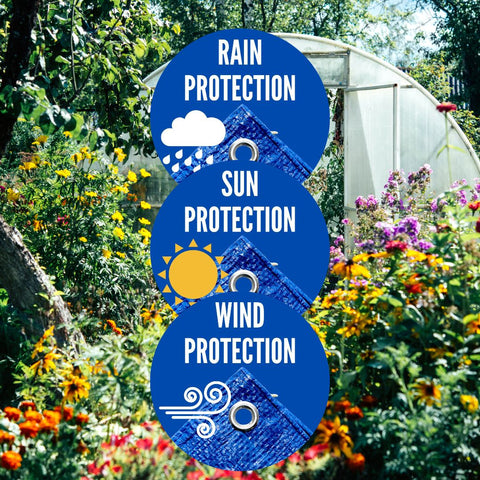Introduction
As we navigate through our gardening journeys, one of the vital tools we often overlook is the poly tarp. It's not just a sheet of plastic but a versatile accessory with endless applications. But, did you ever consider how effectively a poly tarp can be used for weatherproofing your garden?
Understanding Poly Tarps
Before delving into the benefits and practical uses of poly tarps in our gardens, let's take a quick look at what they are.
What is a Poly Tarp?
Poly tarps, or polyethylene tarps, are weather-resistant sheets that are extremely durable and versatile. Used for a multitude of purposes, these tarps are perfect for gardeners worldwide.
Why Choose Poly Tarps for Your Garden?

Still on the fence about using poly tarps? We present to you some of the core benefits.
Weather Protection
Poly tarps provide excellent protection against different weather conditions, keeping your garden safe from harsh sun, heavy rain, and frost.
Pest Control
Poly tarps can also play a role in pest control. By covering plants, you create a barrier that pests can't penetrate, ensuring your plants stay healthy and bug-free.
Weed Suppression
Tarping is a widely used organic method of weed suppression. The light-blocking ability of the poly tarps helps suffocate and kill weeds underneath.
How to Use Poly Tarps for Weatherproofing Your Garden
Now that we have discussed the benefits, let's look at the practical ways to use poly tarps to weatherproof your garden.
Creating a Mini Greenhouse

With poly tarps, you can create your own DIY greenhouse. It will help extend the growing season and protect delicate plants from cold weather.
Frost Protection
Cover your plants with a poly tarp on frosty nights to keep them from freezing. Be sure to remove the tarp once the temperature rises to prevent overheating.
Rain and Wind Shield
In case of heavy rain or wind, use a poly tarp as a shield. Secure it properly to ensure it stays in place during the storm.
Precautions When Using Poly Tarps in Your Garden
As with any gardening tool, there are certain precautions to take when using poly tarps.
Avoid Overheating
It's crucial to monitor the temperature under the tarp. On hot days, it might get too warm for the plants, potentially damaging them.
Properly Secure Your Tarp

Ensure that your tarp is properly secured to withstand windy conditions and not blow away, causing damage or losing its protective effect.
Regular Check for Pests
Even though tarps help keep pests away, some pests can still find their way underneath. Regular checks and pest control measures are necessary.
Conclusion
The use of poly tarps in weatherproofing your garden is a game changer for serious gardeners. The versatility and functionality of these poly tarps make them an indispensable tool in your gardening kit. From providing protection against harsh weather conditions to helping with pest control and weed suppression, poly tarps have it all.
Remember to use your tarp practically, and your garden will thank you for it. Don't just garden, but garden smart with poly tarps!
Frequently Asked Questions
Can poly tarps harm my plants?
No, provided they're used correctly. Always ensure to monitor the temperature underneath and remove the tarp once the weather improves.
Are all poly tarps UV resistant?
Most poly tarps are UV resistant, but it's always best to check the product description before purchasing.
Is poly tarp waterproof?
Yes, poly tarps are generally waterproof. They are constructed from polyethylene, a plastic material that naturally repels water. However, it's important to note that not all poly tarps offer the same level of waterproofing. The extent of water resistance can vary based on the specific tarp and its quality. If you require reliable water protection, it is advisable to select tarps explicitly labeled as "waterproof" or "water-resistant" to ensure optimal effectiveness.
How long do poly tarps last?
The lifespan of poly tarps can vary depending on multiple factors, including the quality of the tarp, the conditions it is exposed to, and how well it is maintained. On average, a poly tarp can last anywhere from several months to a few years. However, exposure to harsh weather conditions such as intense sunlight, strong winds, or extreme temperatures can accelerate wear and tear. To extend the lifespan of a poly tarp, it is recommended to store it properly when not in use, protect it from prolonged exposure to sunlight (UV radiation can degrade the material), avoid sharp objects that could puncture or tear it, and periodically clean it to remove dirt and debris. Regular inspection for signs of damage or weakness is also advisable, as timely repairs or replacements can help maintain the tarp's effectiveness and longevity.
How do I secure my poly tarp in my garden?
Use heavy objects, stakes, or specially designed tarp clips to secure your tarp.
Can I use poly tarps for composting?
Yes, poly tarps can be used to cover compost piles to maintain heat and moisture while keeping pests out.
Can I wash my poly tarp?
Yes, poly tarps can be cleaned using mild soap and water. It's recommended to clean them regularly to prolong their lifespan.





